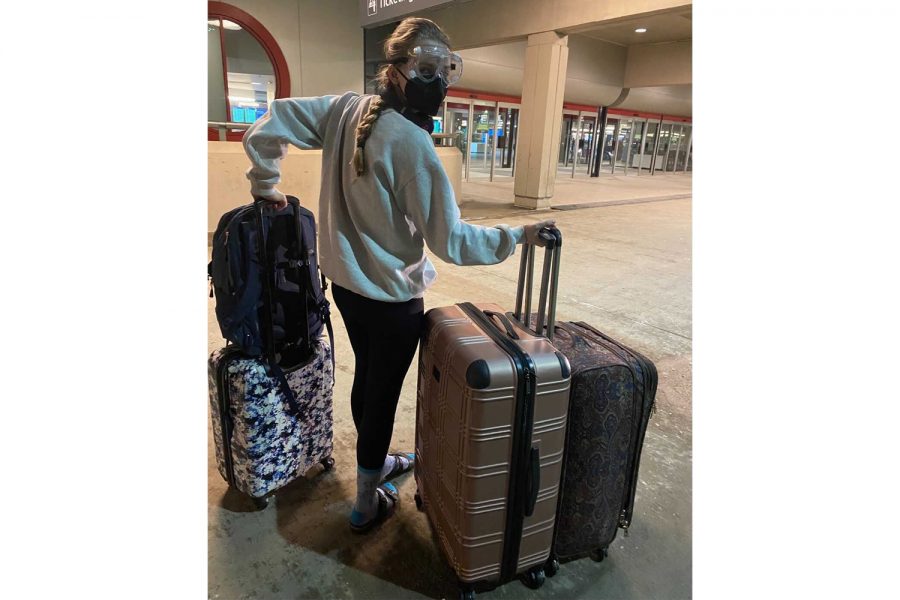Opinion | I traveled internationally during the COVID-19 pandemic
I traveled internationally during one of the worst spikes of the COVID-19 pandemic. The differences between how the United States treats travel compared to other countries was astonishing.
March 21, 2021
On the day I boarded my international flight from Pittsburgh to Antigua, there were 155,705 new cases of COVID-19 in the United States.
It was Jan. 25. For almost everyone else at the University of Iowa, it was the first day of a new semester. For me, it was the first day of my new life in a foreign country — a country I would be living in for three months.
And I was terrified.
As someone with two rare, genetic conditions, my life hit the pause button hard when COVID-19 began. My first semester was spent working at home and, staring down the barrel of my second semester with COVID-19 cases climbing, I made the choice to move in with my sister in January.
A sister who lives and works in the Caribbean country of Antigua, over 2,000 miles away from home.
At the time of my departure, Antigua, a country of 80,000 people, had a weekly average of two COVID-19 cases and serious restrictions. America had nearly twice as many cases as the entire population of Antigua on the day I left.
Leaving was the clearest and safest decision I could make. The hard part was getting there.
International travel during a pandemic is sticky at best. You need a PCR COVID-19 test, not a rapid response, and at least three to five days for lab results, not including weekends. If you were me, at-risk with two genetic disorders, that stickiness thickened into a syrup.
The morning I left, I looked like a human bubble. A huge sweatshirt, leggings, and high socks covered my exposed skin. Gloves, a KN95 mask, and snow goggles covered every other point of access. Strapped to my side was a container of hand sanitizer. It was above and beyond what was called for to travel. But with my condition, I wasn’t taking any chances.
I had worked retail for six months during the pandemic. I was used to mask-flouters and I suspected it would be bad, but not even I could have guessed how terrifying it was.
People. Everywhere. Few were properly social distanced in lines. Half of them wore masks that didn’t cover their noses, including some airport staff, and everyone looked at me like I was some kind of freak in full protective gear. Someone behind me even made a joke that I was a “liberal snowflake.”
I blinked back my panic behind my snow goggles and swallowed hard. I was doing what I had to do to keep myself safe — even if no one else believed or saw it. So, with a confidence I didn’t have, I walked up to the American Airlines desk, presented my negative COVID-19 test, and sanitized my hands for the first time in a thousand that day.
It is not an exaggeration to say that those 12 hours were the most uncomfortable I had ever been. I couldn’t touch anything without sanitizing before and after. After seeing the airport, I was too scared to take my mask off for even a sip of water or granola bar.
For some people, this may not seem so scary. But for me, every cough could risk my life, and I was entering a third-world country with little medical support if I contracted the virus in the airport.
So, with the exception of swallowing a bottle of water once on my second flight, I did not take off my mask, eye protection, or go to the bathroom for 12 hours.
At 3 p.m., I landed in Antigua, expecting more chaos. What I got was something else entirely.
Workers in PPE from head to toe, stood at different checkpoints throughout the airport, ensuring social distancing. There were three required hand sanitizing stations before completing customs, a temperature check, and, wildest of all, a video camera that took my picture and recorded who I was before I entered Antigua. From the airport to my car, I did not see a single local without their nose covered.
But most interesting of all was the conversation I had with my cab driver.
It was a 45-minute drive to where I was staying. During that time, I built up a rapport with my driver. When I told him I was American, he laughed.
“No, really,” he teased. “You’re too nice to be American.”
I folded my hands in my lap and asked him what he meant. What he said changed a huge part of my understanding of the pandemic.
COVID-19 isn’t an American problem. How America reacts to COVID-19 is an everyone problem. Even here, 2,000 miles away, the locals are feeling the impact of how America treated the pandemic. Sixty percent of Antigua’s GDP and 40 percent of its investments come from tourism. The longer the pandemic goes on, the more people here lose their income.
Americans and Donald Trump were mocked as idiotic and incompetent. For most Antiguans, it seems an obvious choice: wear a mask to fix the economy sooner. No one wants another lockdown.
But for us? The logic isn’t the same. The difference between the Antiguan and American airports was astonishing. I remembered the carelessness as I arrived, the “liberal snowflake” comment, and how the people around me wouldn’t pull their masks above their nose.
“I understand,” I told him.
This was the side of America that caused me to leave. As I got out to the car to enter my two-week total quarantine, I found myself remembering his words as I scrubbed my body and sanitized my bags.
America isn’t a bubble. And while the pandemic may be over soon, other countries will not forget how we handled one of the darkest hours in modern times.
I certainly won’t.
Columns reflect the opinions of the authors and are not necessarily those of the Editorial Board, The Daily Iowan, or other organizations in which the author may be involved.




